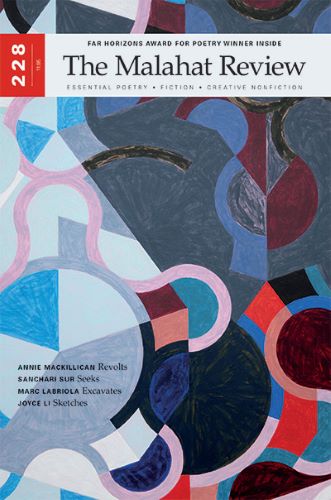6X6 – Summer 2012
Volume 26
Summer 2012
Triannual
Lesley Dame
6X6 is an eccentric little number, a mini-compilation of avant-garde poetry. When you pick up the most recent issue of 6X6, titled “Enough About Pigs,” you know you’re in for a party. The journal is slim and funky, its bubble-gum pink cover accented with red letters and held together by a nifty red rubber-band for the binding. This poetry magazine, published by Ugly Duckling Presse, is a chapbook like no other, displaying the innovative work of six poets.
6X6 is an eccentric little number, a mini-compilation of avant-garde poetry. When you pick up the most recent issue of 6X6, titled “Enough About Pigs,” you know you’re in for a party. The journal is slim and funky, its bubble-gum pink cover accented with red letters and held together by a nifty red rubber-band for the binding. This poetry magazine, published by Ugly Duckling Presse, is a chapbook like no other, displaying the innovative work of six poets.
All six poets, while unique, tend to follow along these lines: strange images, interesting contemplation, devil-may-care attitude, gritty honesty, and a sprinkling of angst. You’ll have to decide for yourself if this is an aesthetic you find enjoyable. If anything, whether good or bad, I find the poems deliciously intriguing. I also like short, manageable poems in equally short, manageable magazines. I’m a toddler mom. I have little time to spare.
Steve Muhs’s six poems are short, often jarring pieces with a mixture of ordinary images and profound ideas. He takes the big bang, the cycle of life, science, God, and Freud and tosses in whiskey and salt and drug dealers and policemen. This sacred/profane dialogue is funny and raw. For instance, the one poem that actually has a title is called “A SPAGHETTI DINNER FOR THE KID WITH LEUKEMIA, EVERYONE IS EATING THEIR FILL.” This humorous title also makes you feel awkward and sad. You are laughing, and now you are ashamed.
Dot Devota’s poems are more serious than Muhs’s, with longer lines and almost no punctuation, which gives them a heavy, frantic feel. Devota’s rambling collection of images, like “the scab in the back of my throat / what used to be a blooming torso / pacing between elephant tusks / and the memory gravity leeches,” play a constant reel of anxiety through your mind as you read. You feel like you’re climbing to the top of a roller-coaster, only the cart goes faster and faster as you climb, and the descent ends abruptly, flinging you from your seat with fabulously haunting lines like, “the scene is of my massacres.”
William Minor’s first poem, “Beijing” begins: “The spectacle of a woman on fire is an ordinary spectacle.” Minor makes a lot of bizarre statements and then, sometimes, analyzes them with images and psychology (his own?). For instance, “Situations are reasonable. I like drinks and sausages.” These lines, which sometimes become repetitive and rhythmic, have me reading the same super-short poems over and over, just for the pleasure of the sound. This is a good thing. I can’t say I always (or ever?) understand these poems, but they are a great read.
Martha Ronk’s poems, like Devota’s, also rely heavily on collections of images. The difference here is that Ronk’s images flow more naturally and build upon one another. In my opinion, Ronk’s poems have the most urgency of the bunch. They are relevant and relatable and speak to modern issues, both personal and public. I think these lines from “The Obliquity of the Ecliptic” demonstrate these traits: “Bent over images (the damp morning newspaper) / (the back of another’s back) were then / the curl of interminable losses cornering us / in mutually exclusive positions.”
Every one of Levi Rubeck’s poems is titled with a series of X’s. I’m not sure if this means they are untitled, or indeed, titled “XXX XXX…” in varying degrees of X’s. No matter. Like Minor, Rubeck makes interesting declarations, like “Replace your scientists and we can / prevent the holidays.” Like Devota, Rubeck compiles odd, interesting images: “More affection from this gorgeous, / friend, she picked the catnip / of competition because synthesized human // pheromones reject cheap / imitations. A siren nests in the / inhuman Santa Monica winter.” Like all the others, Rubeck is working through some big issues. In this particular poem (18 X’s), I think it has something to do with religion.
By the time I get to the last poet in the magazine, I am expecting yet another unique poet who also has fascinating images, neat observations, and a dash of personal philosophy. Abraham Adams does not disappoint when he begins, “My own life is strange / commotions in fat.” In truth, he had me at “commotions of fat.” Still, I read on. What comes next is the strangest of all: “cradling their tectonic dowry / on repeat. // Masks in the little ponds, / are you these masks tied to figs // with their blossoming iron?” WHAT? (Draw out the “A” for about five seconds.) I have no idea what this means, but I enjoy it a heck of a lot. After this he says, “Most life is like you, / most airplanes worry,” and I feel comforted. I feel like Adams understands human nature completely regardless of my understanding of his images.
This is a weird magazine in the sense that it is cutting-edge and rare, and half the time I have no idea what’s going on. The fact that I don’t get most of the poems doesn’t mean I didn’t love every minute of them. And I’m also aware of my responsibility as the reader—although I may have to reread these poems several times, I know that with time, I will come to understand and appreciate them better and better. If you like the type of work that defies the laws of contemporary poetry, 6X6 will throw you one wild hootenanny.
[www.uglyducklingpresse.org]




